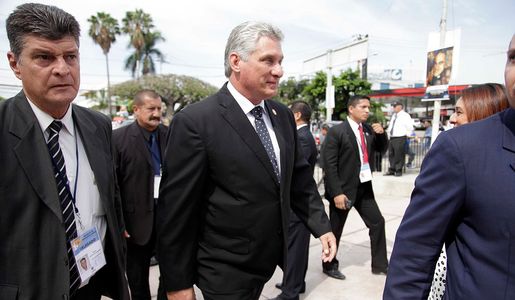Hare in Latin America Advisor on Díaz-Canel’s Foreign Policy
Amb. Paul Webster Hare, Senior Lecturer at the Frederick S. Pardee School of Global Studies at Boston University, was recently interviewed for a story on Cuban President Miguel Díaz-Canel’s foreign policy.
Hare was quoted in a November 15, 2018 article in Latin America Advisor entitled “Will Díaz-Canel Shake Up Cuba’s Foreign Policy?”
From the text of the article:
“President Trump’s policy mix on Cuba has virtually no international support as the U.N. vote on Nov. 1 showed. So, Díaz-Canel can still use the U.S. embargo to excuse Cuba’s struggling economy. Trump’s stance has given DíazCanel his best possible inauguration gift. Russia and China oppose Trump’s position on the Iran nuclear deal and are not pressing the DPRK (North Korea) to denuclearize. Cuba is a long-time ally of the DPRK. China and Russia want to demonstrate they have global outreach beyond maintaining their old ties with communist Cuba. Bolsonaro will try to associate with Trump on trade, Israel and Iran, among others, but Trump’s stock is falling internationally after his election loss. Bolsonaro may reduce Brazil’s dependence on Cuban doctors—a lucrative business for Cuba. But it is hardly a priority for him to break diplomatic relations. I doubt whether China and Russia will bankroll Cuba again and will probably be urging economic reforms. They don’t want to be landed with another Venezuela. Díaz-Canel’s foreign policy is to rely on old friends in the hope they will provide credit and Russian oil. He wants to show Cuba can still be relevant, and he knows Trump’s hostility greatly helps his cause. Conservative governments in South America are more concerned with the migration impact of Venezuela than with rocking the Cuban boat. It is seldom popular politically in the region to align with the United States. Trump may find some support for his policies on immigration, but not for Cuba-related reasons.”
Amb. Hare teaches classes at Boston University on Diplomatic Practice, Arms Control, Intercultural Communication and on Cuba in Transition. His novel, “Moncada – A Cuban Story”, set in modern Cuba, was published in May 2010. His book “Making Diplomacy Work; Intelligent Innovation for the Modern World.’ was published in early 2015.
